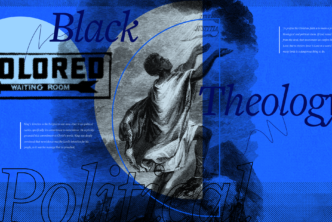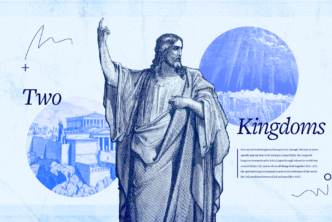As a Catholic, I’m delighted when non-Catholic Christians ask me about what Catholics believe and why. I find that many of those questions involve the relationship of the Catholic Church to the Bible.
There are many misconceptions and caricatures about the Catholic doctrine of Scripture. By the end of this article, my hope is that, while Protestant readers may still object to the Catholic position, at least we can be sure it is the real Catholic position, not a caricature, that they find disagreeable.
Table of contents
Divine revelation
It is sometimes suggested that in contrast to Protestants, Catholics believe that divine revelation is made up of Scripture plus Tradition, rather than Scripture alone. But that’s not quite right. Catholics do not believe that the fullness of revelation is either Scripture alone or Scripture plus Tradition. Instead, the Second Vatican Council (in the document Dei Verbum, “The Word of God”) insists that Jesus himself “is both the mediator and the fullness of all revelation” (Dei Verbum 2).
After all, “revelation” (ἀποκάλυψις) is literally the “unveiling” of God, and Jesus is “the image of the invisible God” (Col 1:15). As the opening words of the epistle to the Hebrews puts it,
in many and various ways God spoke of old to our fathers by the prophets; but in these last days he has spoken to us by a Son, whom he appointed the heir of all things, through whom also he created the world. (Heb 1:1–2 RSV)
The “Word of God” in its fullest sense isn’t the Bible; it’s Jesus.
This lends some important ideas for how Catholics understand divine revelation, including the Bible. “Jesus perfected revelation by fulfilling it through his whole work of making himself present and manifesting himself,” i.e., through his words and deeds throughout his life, death, and resurrection. It follows then that “we now await no further new public revelation before the glorious manifestation of our Lord Jesus Christ” (Dei Verbum 4). In lieu of awaiting a new Messiah or a Newer Testament, we “contend for the faith which was once for all delivered to the saints” (Jude 1:3 RSV).
Scripture and Tradition
Catholics routinely hear that we “nullify Scripture” by believing that Apostolic Tradition is divinely protected. On its face, the charge makes sense: Doesn’t Jesus condemn tradition when he tells the Pharisees, “for the sake of your tradition, you have made void the word of God” (Matt 15:6 RSV)?
But the biblical reality is more nuanced. The Greek word for tradition, παράδοσις, simply means “something handed on.” Whether a particular tradition is good or bad thus turns entirely on what it is being handed on, from whom, whether it is divinely inspired or manmade.
For instance, St. Paul tells the Thessalonians,
stand firm and hold to the traditions which you were taught by us, either by word of mouth or by letter. (2 Thess 2:15 RSV; emphasis added)
My point here isn’t just that Paul calls Christians to hold to orally transmitted Apostolic Traditions (“capital-T Tradition,” if you will) instead of Scripture alone. Rather, it’s to note that Paul also speaks of the New Testament writings themselves as παράδοσις, “traditions.” Some Protestant Bibles (like the NIV) translate the word here as “teachings,” but it’s simply the plural form of the same word that Jesus uses in critiquing the traditions of the Pharisees (Matt 15:6). So there’s no way to separate Christianity from Tradition without separating Christianity from the New Testament.
As for the two means of communicating Apostolic Tradition that St. Paul speaks of—word of mouth and epistle—the Catholic view is that “flowing from the same divine wellspring,” there is “a close connection and communication between” them, and that they “merge into a unity and tend toward the same end” (Dei Verbum 9). In other words, they’re two expressions of the one source of divine revelation: God himself.
The Church and Scripture’s authority
A common misconception about the Catholic view is that Catholics believe that the Church somehow imbued the Scriptures with qualities of inspiration and authority. For instance, the Reformed theologian Michael Kruger has written and spoken extensively on the question of the biblical canon (which books belong in the Bible, and why).1
In both his writing and his talks, he uses the illustration of a thermostat and a thermometer. Both can tell you the temperature in the room, but the thermostat creates the temperature, while the thermometer merely reflects it. Kruger claims that
the difference between those two things really captures the difference between the Protestant view of the church and the Roman Catholic view of the Church. See, the Roman Catholic view of the Church is that it creates the canon, it makes the canon what it is. The Protestant view of the Church is that the Church simply responds to the canon, responds to what’s already there.2
But this is the opposite of the actual Catholic view. As the First Vatican Council explained back in 1870, the Church holds the books of the Bible to be
sacred and canonical not because she subsequently approved them by her authority after they had been composed by unaided human skill, nor simply because they contain revelation without error, but because, being written under the inspiration of the holy [sic] Spirit, they have God as their author, and were as such committed to the Church. (Dei Filius 7)
In other words, the Catholic Church’s role in the formation of the biblical canon was not that of a thermostat, turning ordinary books into inspired Scripture by ecclesial fiat. Instead, the Church’s role was that of a thermometer, recognizing (and compiling into one book) the various Old and New Testament writings which already carried divine authority because of their inspiration and divine authorship.

Start a study on Roman Catholic beliefs using Factbook inside Logos. Get it free, if you don’t already have it.
The Church and the canon
So what is the role of the Church in relation to Scripture? While the Holy Spirit is the divine author of Scripture, and the guarantor of its reliability in “teaching solidly, faithfully and without error that truth which God wanted put into sacred writings for the sake of salvation” (Dei Verbum 11), he chose to work through churchmen. That is, the New Testament didn’t create the Christian Church. Rather, Christ created the Church (cf. Matt 16:17–19), and the Holy Spirit worked through authorities within that Church, who served as the human authors of the biblical texts. Other members of the Church, recognizing these writings as important and even inspired, preserved and copied them. Over the centuries, the Church (both locally and eventually universally) affirmed precisely which seventy-three books were considered authentic parts of the Bible, a canon agreed to by the Eastern Orthodox and Coptic delegates at the Council of Florence in 1442. (Seven of these books would later be removed from Protestant Bibles, but we must leave that story aside for now.)
The point here isn’t merely historical: that the Church played an important role in the Bible getting to us today. The point is that the reliability of the early Church is closely linked to the reliability of the Bible. Since the Bible doesn’t have an inspired table of contents, how do we know that we have properly discerned the right books? You could argue that you know which books belong in the Bible on purely subjective grounds, like the “burning in the bosom” feeling promised to those who read the Book of Mormon (see Doctrines & Covenants 9:8). But even were such an experience to be considered reliable, it couldn’t tell you that your Bible was complete. Without reading every other possible ancient text, how do you know there aren’t other books out there that could cause the same feelings?
Christians, historically and today, have instead defended the biblical canon on objective grounds. Typically, the canonicity of New Testament books is defended on the grounds (for instance) of their apostolicity (being written by an apostle or a companion of an apostle), their orthodoxy (they agree with the Gospel as orally proclaimed by Jesus and the apostles), and their usage in the early Church liturgically and in establishing doctrine. But how do we know which books were apostolic or orthodox? Saints Matthew, Mark, Luke, and John never tell us that they wrote the four Gospels, and plenty of false teachers did write gospels purportedly from apostles. So it’s not due to the internal evidence. Rather, it’s because the early Christians attested to their apostolicity and orthodoxy.
To some extent, then, any objective answer to the question, “How do we know which books belong in the Bible?” is going to come down to the fact that we trust that the early Church got it right. That trust might be on natural grounds (they were in a better position to answer questions about who wrote what, or what the oral preaching of the apostles taught) and/or on supernatural grounds (the Holy Spirit protects divine self-revelation by protecting the Church from error). But the inescapable conclusion is that the trustworthiness of the Bible is linked to the overall trustworthiness of the Church. After all, if you believe that the early Christians had already apostatized, or at least were thoroughly confused about the message and content of the Gospel, how much confidence could you have that they were clear-eyed about the apostolicity or orthodoxy of the books we now call the New Testament?
The Holy Spirit and Scripture
Relatedly, I’d suggest that there’s good reason to believe that the Holy Spirit protects both the letter and the meaning of the Scriptures.
The Church in the New Testament isn’t just a group of people who happen to follow Jesus. Instead, the Church is formed by Christ as “his body, the fulness of him who fills all in all” (Eph 1:23 RSV). Taking the idea of the Church as both the “Body of Christ” and the “fullness of Christ” seriously entails thinking of the Church (in some way) as a continuation of the incarnation, since that’s what it means for God to have a body.
If that’s true, and if we can trust that the Holy Spirit protected the Church from mistakenly adding or losing books of the Bible, and if the Church was faithful and attentive enough to reliably hear his voice, it seems to logically follow that we should trust the Church’s interpretation of the Bible. As St. Jerome once observed, “the devil himself quoted Scripture, and the essence of the Scriptures is not the letter, but the meaning.”3 It does us no good to have a divinely inspired, divinely protected Bible if we don’t know what it means.
The Magisterium and Scripture
And here, we return to where we began: considering the relationship of the Magisterium to the Bible. Those who ask if the Catholic Church views itself as “above the word of God” often follow up by asking what I would do if the Catholic Church taught something that “clearly contradicted” Scripture. My response is that this is impossible, if what we believe about the Holy Spirit, the Body of Christ, and the Bible are true. What is possible is that the Church will interpret the Bible in a way that contradicts my interpretation of the Bible. But then the decision isn’t between choosing to follow Jesus or his Body. It’s between listening to my own personal interpretation or “the church of the living God, the pillar and bulwark of the truth” (1 Tim 3:15 RSV).
To be clear, there are two possible questions being asked here: Whether the pope and the bishops of the Church can go astray in ungodly ways (certainly yes), and whether the teaching authority of the Church can err in its task of “authentically interpreting the word of God” (Dei Verbum 10). While the two are related, I will speak only to the latter question.
Frankly, none of this is new territory. After all, there’s a two-thousand year history of people wrongly believing that the Church’s teaching contradicts what Scripture “obviously” teaches.
For instance, even in the early Church, “some men came down from Judea and were teaching the brethren, ‘Unless you are circumcised according to the custom of Moses, you cannot be saved’” (Acts 15:1 RSV). Properly understood, this was a debate over how to interpret Old Testament passages like Genesis 17:10, in which God declares to Abraham, “this is my covenant, which you shall keep, between me and you and your descendants after you: Every male among you shall be circumcised” (RSV). On its face, that looks like circumcision will be required forever. In verse 19, God calls it “an everlasting covenant for his descendants after him” (RSV). If we’re just going with the plain language of the Bible, the “circumcision party” wins (particularly since the New Testament texts that contradict their theology hadn’t been written yet!).
But that’s not how the matter was resolved. First, Paul and Barnabas engaged in “no small dissension and debate with them,” but it seems to have gone nowhere (Acts 15:2 RSV). They then turn the matter over to the Church. “The apostles and the elders were gathered together to consider this matter” at what we now call the Council of Jerusalem (v. 6 RSV). The council then determined against the circumcision party. Instead, they announced only three Levitical requirements as binding on Gentile Christians, and circumcision wasn’t one of them.
In so doing, the council claimed to speak on behalf of God, writing that “it has seemed good to the Holy Spirit and to us to lay upon you no greater burden than these necessary things” (v. 28). The council is not claiming to have received some new divine revelation about Gentile Christians, as Peter had back in Acts 10. Instead, they were simply applying what they had already received, trusting that the Holy Spirit protected both the letter and the meaning of what had been revealed.
This highlights the ongoing role of the Magisterium of the Church: not creating (or even receiving) new revelation, but faithfully interpreting what has already been revealed.
Conclusion
There are plenty of reasonable questions, and even critiques, of the Catholic view of Scripture, and its relationship to both Apostolic Tradition and the teaching authority of the Church. That’s a conversation well worth having, and one that can be mutually enriching to Catholic and non-Catholic Christians alike. But an important part of clearing the way for that enriching conversation is making sure that all involved understand what it is that Catholics really believe about Sacred Scripture over against what are simply popular falsehoods.
For further study on what Catholics really believe, consider these resources
Catechism of the Catholic Church (U. S. Edition with Glossary and Index)
Regular price: $10.99
Mobile Ed: TH351 Perspectives on Justification by Faith: Five Views on Its Meaning and Significance (4 hour course)
Regular price: $149.99
- Catholicism: A Journey to the Heart of the Faith by Bishop Robert Barron
- The Belief of Catholics by Msgr. Ronald Knox
- The Early Church was the Catholic Church by Joe Heschmeyer
- The Eucharist is Really Jesus by Joe Heschmeyer
- The Catholic Controversy: A Defense of the Faith by St. Francis de Sales
- Why We’re Catholic by Trent Horn
Explore our Roman Catholic packages
Related articles
- The Definitive Guide to Christian Denominations
- Anglican History: Reformed, Catholic, or Confused?
- Verbum Blog: How to Study the Bible Like a Catholic
- Verbum Blog: The Vulgate: Saint Jerome’s Legacy
- Verbum Blog: The 9 Best Catholic Study Bibles: A Comprehensive Guide
- See, for instance, Michael Kruger, Canon Revisited: Establishing the Origins and Authority of the New Testament Books (Wheaton, IL: Crossway, 2012), and The Question of Canon: Challenging the Status Quo in the New Testament Debate (Downer Grove, IL: InterVarsity Press Academic, 2013).
- See video linked here: “Did the Church Decide Which Books Made It into the Bible?,” Ligonier, May 22, 2019, https://www.ligonier.org/posts/did-church-decide-which-books-made-it-bible.
- Jerome, Dialogue against the Luciferians 28, in Nicene and Post-Nicene Fathers 2.6: St. Jerome: Letters and Select Works, eds. Philip Schaff and Henry Wace (Buffalo, NY: Christian Literature Company, 1893).





